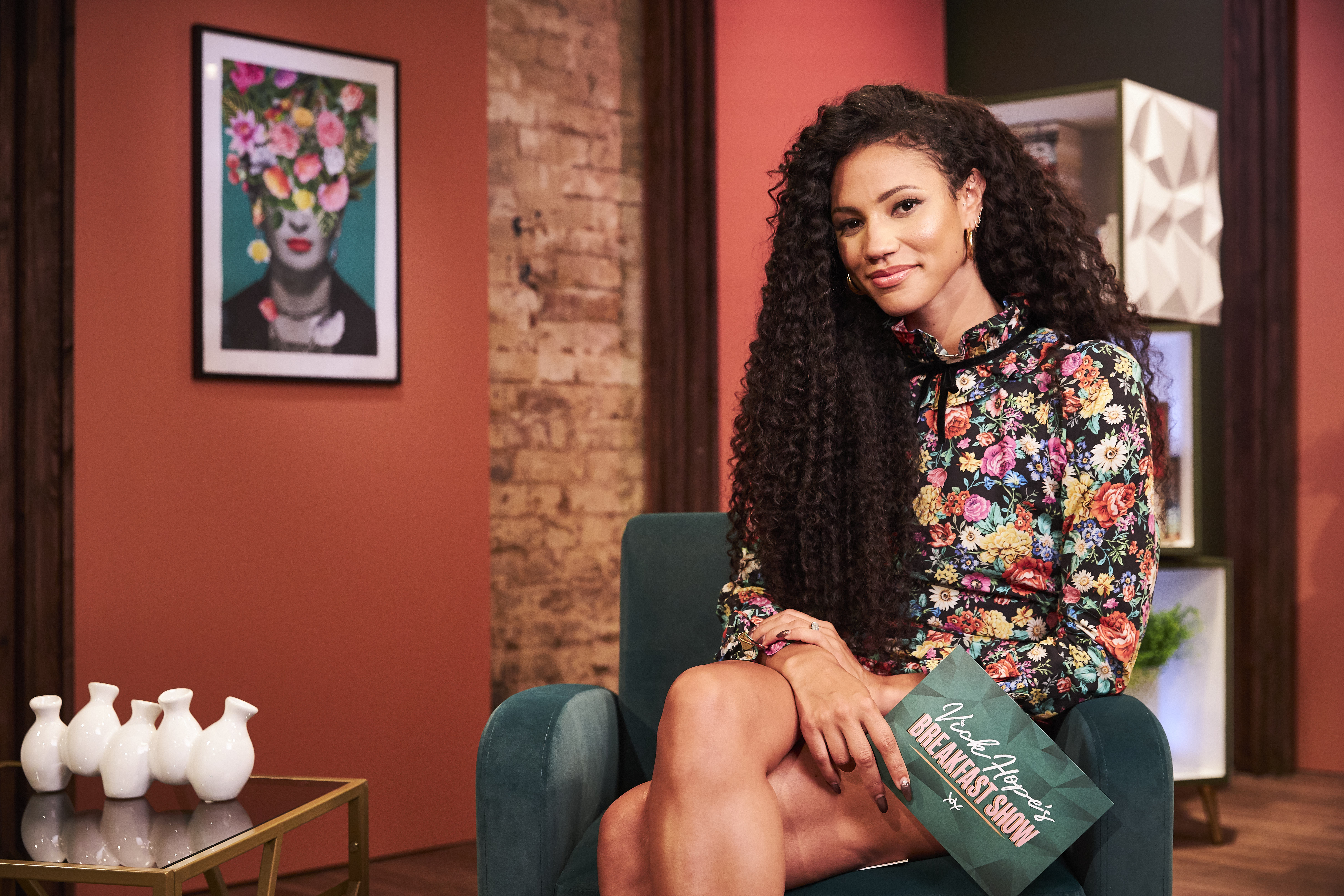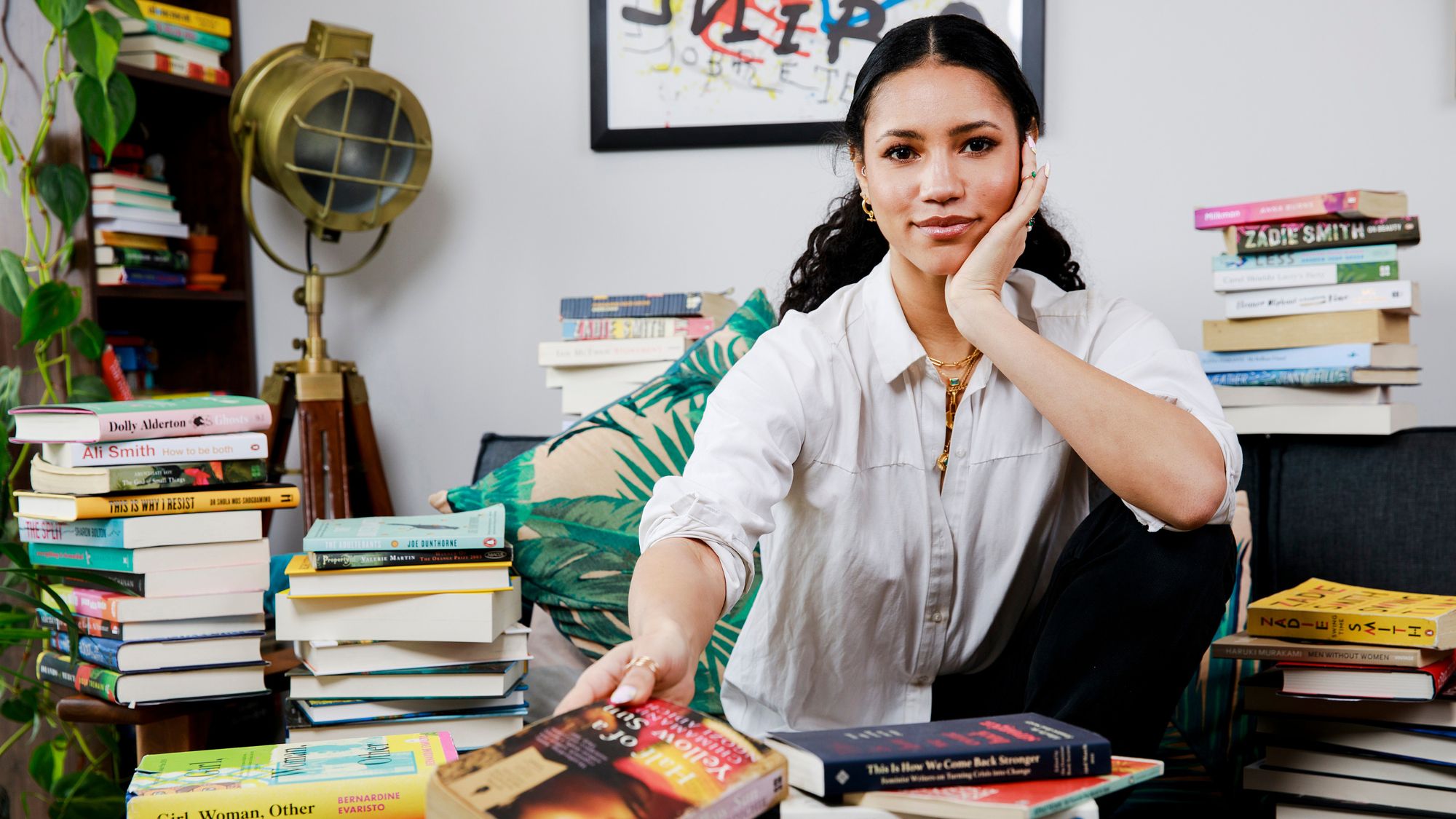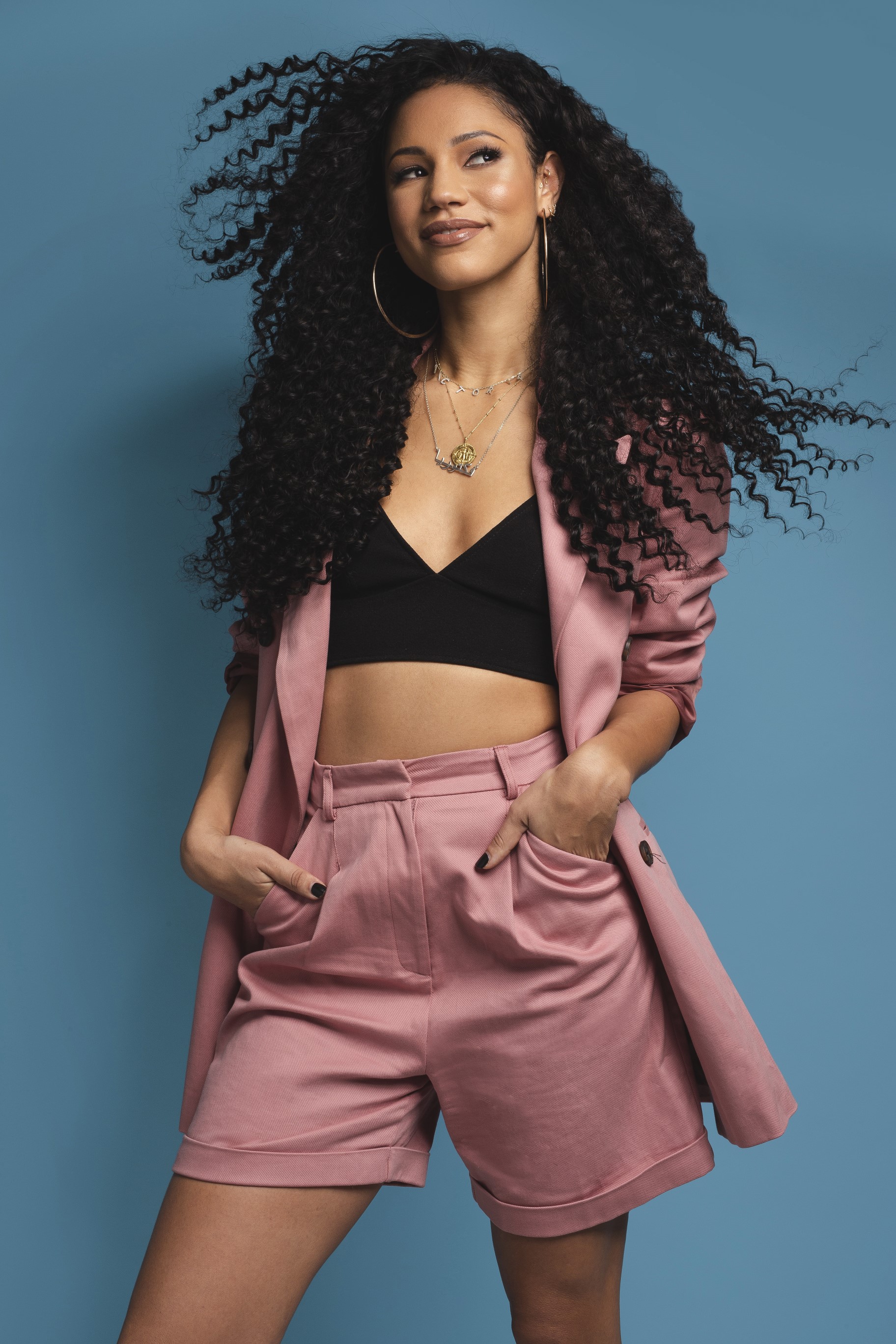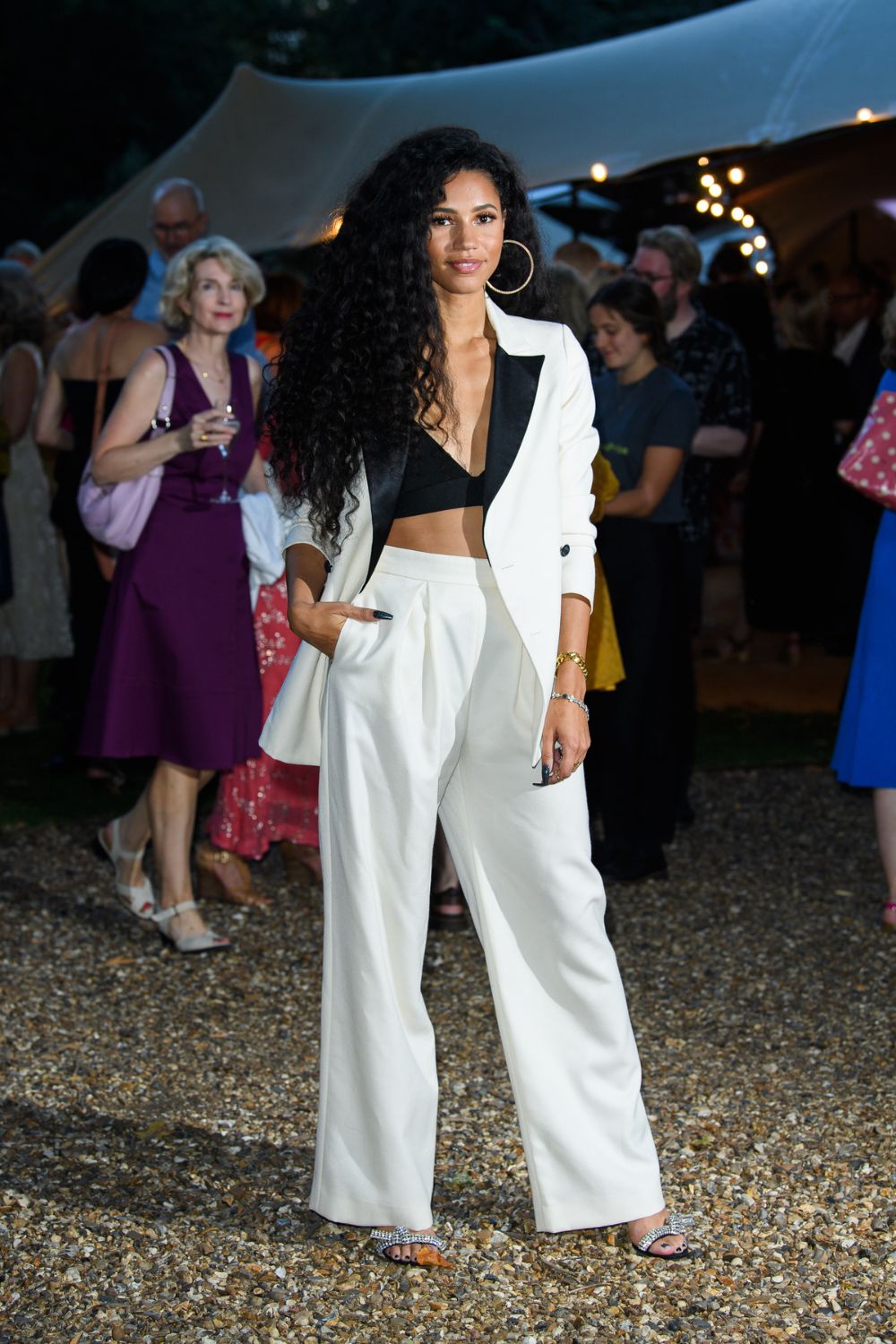Vick Hope: "The world is a better place the more stories there are in it"


Celebrity news, beauty, fashion advice, and fascinating features, delivered straight to your inbox!
You are now subscribed
Your newsletter sign-up was successful
Vick Hope is sunshine personified, and from her BBC Radio 1 presenting to her Songs To Live By podcast, she is on a constant mission to spread joy.
Kind, warm and funny, with razor sharp insights, a bucket load of charm and the kind of eloquence you can only get by reading literally thousands of books, Vick is the whole package.
This past year has seen her get people home from work and school with her regular BBC Radio 1 show, bringing relaxation, laughter and escape to viewers across the country. It's proven so popular in fact that Vick was given her own two month ITV programme, Vick Hope's Breakfast Show, over summer, something that people are already calling to return next year.
Additionally, Vick returned to the helm of the Women's Prize for Fiction by hosting their infamous and influential podcast and brought back her brainchild Songs To Live By by releasing a third series across BBC Sounds. But despite her busy schedule, Vick is still taking on more, determined to make her mark on the world and leave it a better place.
"If I can make someone smile - even if it's one person, then that's a good thing," Vick told Marie Claire UK. "When I set out to become a broadcaster, I wanted to tell stories, to communicate, to have a good time and for the people around me to be having a good time. If I can help them do that, then it's a job well done."
But what about the woman behind the name? Features Editor Jenny Proudfoot sat down with Vick to talk gratitude, career advice, book recommendations and what's next...

You've been getting people home from work or school for just over a year now. What do you hope people will take from your BBC radio shows?
I just hope that whatever people have been going through that day - whether that’s at work, school, uni etc., that they can get home feeling a little bit lighter and brighter. I hope that they can forget whatever it is that might have been stressing them out or worrying them, and that they can just feel good. We really wanted to create a place where people can just have fun and laugh about stupid stuff and I think we've achieved that - we don’t take ourselves too seriously. We like it to feel a bit like if you were in a pub and you were sitting around a table with stools that people can pull up. So if people hear a snippet of conversation and are interested in what's being said or have something to add, they can pull up a stool. It’s that sort of vibe - the type of laugh that you'd have with your friends down the pub, and it really feels like a community. Our listeners are so invested and involved - they really guide the direction of the show. In fact, we’ll often start a show without knowing where we're about to go at all, and the texts will come in and it will give us the content and direction. I love that - it’s something that I find really exciting.
Celebrity news, beauty, fashion advice, and fascinating features, delivered straight to your inbox!
Your work always seems to exert happiness and positivity - why is that such an important message for you to spread?
Because I guess that's what we've got isn't it? This world can sometimes feel so overwhelming - I call it being "worldwhelmed". We have so much information, we know so much about what's going on everywhere, and there's a lot to be anxious about. If I can make someone smile - even if it's one person, then that's a good thing. I like to try to remember that that's why I'm doing this. You can get a bit caught up in this industry, and actually it's very simple. When I set out to become a broadcaster, I wanted to tell stories, to communicate, to have a good time and for the people around me to be having a good time. If I can help them do that, then it's a job well done.
That must be especially true with Life Hacks...
Life Hacks is to me the most important job that I do - it's the reason I went to Radio 1 and actually one of the reasons I wanted to broadcast full stop. I used to listen to the Sunday Surgery when I was younger on Radio 1, which is what Life Hacks is now, and it had such an impact. They talked about bodies, mental health, loneliness, education, careers - all this stuff that I had questions about but didn't know who to ask. I found such solace in hearing them talk about these things so honestly and openly, and I felt like I wasn't alone - and that is public service broadcasting. I do this job because I want to bring people a bit of light and joy, but I also want to help. I want to uplift people in any way that I can, whether that's making them happy, making them smile, making them feel like they're less alone, or uplifting their voice so they can tell their story.
A post shared by Vick Hope (@vicknhope)
A photo posted by on
We loved Vick Hope's Breakfast Show during summer - what was it like hosting the show and putting it all together?
I came away from filming that show with a huge grin on my face every single time. And bear in mind we were doing 5am starts to fit around radio, so it was super early in the morning. But I never felt tired - not once, because I was so galvanised, uplifted and inspired by the guests and their stories. I just wanted to do it more and more. It was amazing to have so much creative input in a show - every section was something that I love chatting about. There was a section on books and reading, which I just love. Then there was a part called "Give me hope" where my viewers and guests would bring something that made them smile that week. That was just ready-made joy in a can - it was so uplifting. And then I obviously loved the "Cocktails and Mocktails Sunday Sundowners" section because I love a cocktail. It just had everything that I love, and when you are able to talk about things that you love, it's not work is it? I just felt so lucky and grateful to be able to present this show - I was really lost for words by this opportunity and so thankful to ITV for letting me do 8 weeks of that. I just really hope that it was a little ray of sunshine for listeners.
You’re someone who people come to a lot for book recommendations. Was it nice to be able to do that on a mass scale?
We had an especially female viewership - a lot of them had busy lives and children, and would just have an hour to themselves, so I loved finding and recommending books for them. When time is very precious, you have very little time to read. You don't want to be wasting time experimenting with genres or authors that you're not sure of because that's just time. That’s where I came in. A lot of the authors I interviewed had huge back lists too, which was great for listeners because it gave them a ready made reading list. If you know that this author has lots more to offer, then you’ve already got a list that you can just jump right into.

What are your ultimate book recommendations?
I host the podcast for the Women's Prize for Fiction which is such a stimulating thing to get to do. To speak to these incredible women who have got amazing stories to tell and learn about their lives through the prism of the books that have shaped and nourished them. So, I'm going to pick two books that were actually on the shortlist this year - not just to big up the Women’s Prize or women’s voices in literature, but because these are just two brilliant books. I'm going to say Sorrow and Bliss by Meg Mason. I just don't think I've ever read a more nuanced and multi-faceted depiction of how our minds process and navigate the world, in a way that was so poignant and visceral. It absolutely destroyed me and then it absolutely restored me - I fell in love with the way that she writes, and with my own mind as a result. A good book changes the way you look at the world but also changes the way you look at yourself. And it made me sort of reassess the way that I navigate the world and the way that my mind works. And then also The Book of Form and Emptiness by Ruth Ozeki, which actually won the Women's Prize and rightly so. Whenever I read something that articulates a feeling or thought that I have had for so long but been unable to put into into words, I turn down the page or underline. In this book, every page is turned down and every sentenced is underlined. It is just so erudite - it's like philosophy. It’s literally about objects both man-made and natural, and the way we interact with them as we move through life, but it's more than that. It's about grief, loss, love, music and literature. I feel like her words just dance through the pages - it's just fizzing with wisdom. It’s a big old book but I’ve been carrying it around with me everywhere poking out of my bag this past few weeks, so it’s absolutely mangled. But I feel like I've really been feeding off it - it’s given me so much life, and I hope it gives other people life too.
What role does reading play in your life?
It has really changed over the years. When I was younger I was an avid reader. I read because I was so curious about the world and about other people's experiences. I think reading, especially as a child, teaches you empathy because you learn to walk a day in other people's shoes. You literally see things through their perspective, so you learn that everyone around you is living a life that is as vivid, complex and emotional as your own. It taught me about justice and equality and sparked an activism in me. As I went through life, it became my intellectual stimulation. It nourished me and made me want to make a mark in the world. It inspired me through university and made me want to be a journalist and broadcaster. And then I guess I kind of moved away from it when I moved away from academia, because I equated reading with being under pressure and having a lot on my plate. It was only in the last few years that I found the love of reading again. Now for me it's an escape. When the world feels like it's a little too much, I have books that I can escape into and I have worlds that I can revel in. I was judging the Women's Prize for Fiction during the pandemic and I had 144 books to read in 5 months, but it actually felt like a real joy - it felt like a privilege to be able to enter all of these worlds when I couldn't leave the house.
And you’ve been dedicated to getting children into reading too...
Yeah, I actually wrote a couple of children's books years ago with Roman [Kemp]. I feel really dedicated to making sure as many children as possible can read and get that escape, because they really deserve and need it. It’s so validating for them to find themselves represented on the pages of a book. I volunteer with Akwaaba, a refugee charity in Hackney, and one of the most important things is book donations and getting as many books to as many kids as possible. There is so much power in children’s literacy - it gives their thoughts and feelings validation and they know that their story is worth telling. They all have stories in them but have often been silenced, and it gives them confidence and strength.
A post shared by Vick Hope (@vicknhope)
A photo posted by on
You are a particular champion of female authors - can you tell us a bit about that?
I am a huge champion of female authors - I think that everyone's story deserves to be told and the more perspectives we can have those stories enter the world from, the better. The more we champion and celebrate women authors, the more their work is going to be in the world. The more opportunities there are going to be for young girls who have stories to tell, and the more money there will be from publishers because currently it is not equal and we have a long way to go. I also know from growing up wanting to write that when I felt represented on the pages of the books but also by the authors whose pens they were written by, I felt emboldened, mobilised and confident to pick up a pen myself. I think we should always be encouraging that in young people. The world is a better place the more stories there are in it.
Is there a book that has had the biggest impact on you?
It’s between three. Harper Lee's To Kill A Mocking Bird triggered my activism. It taught me about justice and equality and sparked an activism in me that I then took into later life. I was like, "How is this ok? How is there such injustice in the world? How is there such an inequality?" And I just wanted to do something about it. And then there is Half of a Yellow Sun by Chimamanda Ngozi Adichie. It tells very human stories in the context of the Nigerian-Biafran civil war, which is the war that my mum grew up during. She grew up running from air raids, being fed by the British Cross and housing soldiers - she told me all these stories growing up but from the perspective of a child. There are gaps in her understanding of the socio-political context of the climate because she was just a kid, and Chimamanda Ngozi Adichie plugged those gaps for me. She helped me understand my background, my history and my culture. In fact, my mum always jokes that Chimamanda Ngozi Adichie somehow has been watching her all this time and wrote her story. I just absolutely love the way she writes - I think she's a philosopher without philosophising. She’s so evocative and beautiful, and her characters are so full. And not just Half of a Yellow Sun, but Americanah, Purple Hibiscus - they are books that really spoke to me growing up. And the other one is a book from my childhood, Noughts and Crosses by Malorie Blackman. She spoke to my entire generation about justice, equality and race, in very uncertain terms that we could all understand. But for me, that book was the first time I had ever seen an interracial family other than my own. Not just in the pages of a book or on TV, but at all. I didn't know anyone else that was like that and it helped me. When you see yourself represented on the pages of a book like that, as a little mixed race kid growing up in Newcastle, I was like “Oh my god I'm not alone”. It was solace, it was validation and it was very special, so I owe her a lot.

What is the best advice you've ever received?
Get enough sleep, drink water and look after yourself. It sounds so simple and when I was younger I completely discarded it, but it’s so important otherwise you’ll get frazzled. I've written about that kind of burnout before - that need to constantly prove yourself and plugging the gaps and the silence with constant work. It's a good thing to push yourself but there's only so much you can do when you're exhausted. And on that note, reprioritising, rebalancing and having boundaries. It really does make you do your job better and also it helps you enjoy your life which is the most important. Something I've only realised in the last few years is that life is fleeting, and we have to look after ourselves. Be kind to others and be kind to yourself - that's really the best advice I could give, and the best advice I've taken over the years.
What advice would you give someone entering your career?
Have a hobby. This is especially true if you want to be a broadcaster - don't just do that. This is not only for your own enjoyment and to give you a bit of rest-bite (which are important), but also just to give you something else to talk about. The truth is, if you're into gardening or fine art or jumbo jets, and all of a sudden there's a show about that, you're going to be the person they turn to because you know how to talk about it. So it is important to have hobbies that are varied and wide that spark a passion in you. And another piece of advice that I would give is to understand the production process. It's all well and good being charismatic and sparkly in front of the camera - I don't think that comes necessarily naturally to me, but what I do love is understanding the whole process of what goes into making a show. Early in my career, I learnt to shoot, edit, script etc. I did a brilliant internship with MTV where they taught us all the different cameras, how they all work, all the different edit suites - how they all work, scripting interviews, rolling auto cues, running and getting people's coffees for them - everything, and it has been invaluable. If you understand what everyone's doing on set, you're going to be a) more respectful of the process and b) more helpful in the way that you're presenting the show. Plus it gives you options for different jobs that you may want to go into because it's not the most stable work. If you can do a range of things, then you're setting yourself up well.
A post shared by Vick Hope (@vicknhope)
A photo posted by on
What is next for Vick?
I'm excited to share more great music and conversations about our history and culture through the songs that have shaped us in the new series of Songs To Live By, available now on BBC sounds. It's been a great year for live music - it felt like it exploded back into our lives in 2022, and there are so many fresh artists finally enjoying their chance to perform on bigger stages. So, I’m really looking forward to bringing you more festival and live music coverage next year. I will be back hosting the BAFTA Film Awards red carpet in February - experimenting with my hair and wearing fashion rental. I got into renting pieces this year and now I am on a mission to spread the word about how brilliant it is, and to champion sustainable fashion as much as possible. I want to keep discovering and sharing more ways to dress creatively and economically. You'll also see me in 'Dictionary Corner' on Countdown in December and in Richard Osman's hot-seat on Pointless next year - both absolute dreams come true as I love trivia and vocab, and my dream is to host a quiz show in future. And finally I’m looking forward to making more shows that just make you feel good. Vick Hope’s Breakfast Show gave me a real taste of the type of warm, positive, inquisitive, inclusive chat show I really want to broadcast and I can’t wait to do more!

Jenny Proudfoot is an award-winning journalist, specialising in lifestyle, culture, entertainment, international development and politics. After working at Marie Claire UK for seven years - rising from intern to Features Editor - she is now a freelance contributor to the News and Features section.
In 2021, Jenny was named as a winner on the PPA's '30 under 30' list, and was also listed as a rising star in journalism.